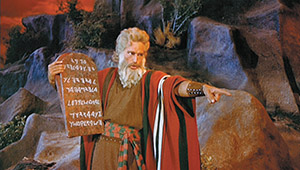
[This drash was scheduled to be delivered on Shabbat at CAJE26, in Fort Collins, CO at Colorado State University. Due to the birth of Chana Elke bat Ari Zvi, the author’s granddaughter, it was not presented at CAJE. It is being presented here in print in honor of her graduation from Yavneh Academy.*]
Being asked to speak on Parshat Va’Ethanan is a darshan’s dream. Aside from the dramatic episode in which Moses is shown the Promised Land, but is not allowed to enter, we encounter the Ten Commandments and the Sh’ma. In addition, it is also Shabbat Nahamu, the Sabbath of Consolation following Tisha B’Av. There is a surfeit of riches to be mined in this week’s Torah reading.
Despite the wealth of general sermonic opportunities presented here, I wish to focus on the lessons that we as teachers can derive from this parsha. I will homiletically extrapolate meanings from verses that may stray from their original understanding but not their intent. I feel that these interpretations have teleological validity.
God rebuffs Moses’s plea to enter Israel (Deuteronomy 3:23 29). How often do we chafe and bristle under the seemingly arbitrary decisions of supervisors? The lesson here is that we need to make ourselves heard, but ultimately, we must accept and adhere to the authority structure. The Torah contains a number of cases where authority was successfully challenged. Abraham and Moses both did it in instances that God allowed. In those situations, the breach was tolerated and accepted. However, in the Torah, when authority is not respected, there are dire consequences. There is a fine line between inspiration and arrogance, between creativity and lack of derekh eretz. We need to be very selective in the battles we fight in order to win the war.
A bit later, we are instructed not to add to or to diminish what is written in the Torah (Deuteronomy 4:2). As educators, we must understand, and be committed to, core issues and curricular goals. Instruction needs to be focused and directed. Too many flourishes or bells and whistles, and the essence is lost and not communicated. Inadequate preparation is also educational malpractice.
We are here because somewhere along the line we were inspired by a talented teacher. We were touched by someone who was passionate, sincere, competent, exciting and knowledgeable. Moses tells the Jewish people, “Don’t forget the Sinai experience.” (Deuteronomy 4:9 11) Those who stood at Sinai experienced the thunder and lightning of a transformational experience. They were instructed to take with them not only the content but the fireworks as well, and pass it on to their children. We need to be those models to motivate and excite our students just as we were motivated to transmit our passion for Judaism, as well as Judaism itself.
Moses repeats the Ten Commandments (Deuteronomy 5:1 18). My rendition is somewhat different:
You shall remember that your Prime Objective is to foster in your students a sense of Jewish pride and Jewish identity, and to give over the basics of Jewish literacy.
You shall not worship the false idols of every new theory, curriculum, teaching tool, technology or technique. Stick to the basics. You shall not rely vainly or exclusively on touchy-feely exercises in place of basic skill acquisition.
You shall introduce some creative fun in your instruction. All work and no play makes for a dull classroom.
Honor your elders. Learn from and value those who have significant experience.
You shall never embarrass a student.
You shall never be untrue to your beliefs, your institution, your colleagues or your students.
You shall not steal. You may always borrow ideas from others, but you must always give them credit. You must always abide by copyright laws.
You shall not validate any falsehood or deception in word or deed. You may not accept distortions or misinterpretations in the name of “progressive education.” Be true to your vision.
You shall not covet any other profession, for in your hands lies the destiny of the Jewish people.
The Shma likewise lends itself to multiple layers of meaning (Deuteronomy 6:4 9).
Listen and understand the singular purpose of your mission. You shall love your students (in whom God resides) unconditionally, even to the point of spending your own money on them. You must constantly review what has been taught and select lessons that resonate in real life, beyond the doors of the classroom, in students’ homes. Ignite a fire in your students’ hearts and minds so that Judaism will always be a part of their lives wherever they go.
Traditionally, repetition is understood to mean emphasis. The Bible is the ultimate pedagogic text. Its main instructional feature is controlled redundancy; i.e., significant concepts and passages are constantly being repeated. As teachers we have a huge task, and an even greater responsibility. We are links in the chain of Jewish tradition stretching back to Sinai. We must impart many facts and details. However, the main core ideas must be emphasized and repeated again and again. A little differently each time, perhaps, but repeated nonetheless.
If we succeed in creating another generation of inspired, proud and literate Jews and maybe a cadre of passionate teachers it will indeed be a consolation. Nahamu, Nahamu Ami
*A version of this article appeared in Jewish Education News (JESNA, Winter 5762) p. 13.
Dr. Wallace Greene, a veteran educator, was the Director of Jewish Educational Services at the Jewish Federation of Northern NJ for a decade; has served as a day-school principal, most notably at the Joseph Kushner Hebrew Academy; was the founder of the Sinai Schools and was one of the founding faculty members at The Frisch School.
By Wallace Greene













